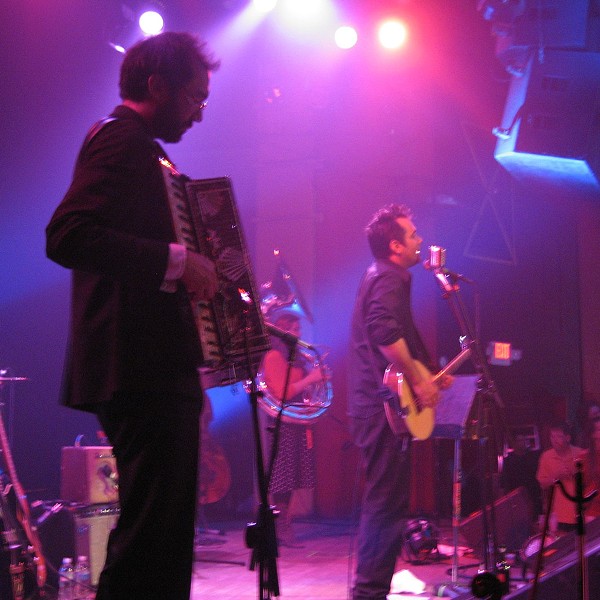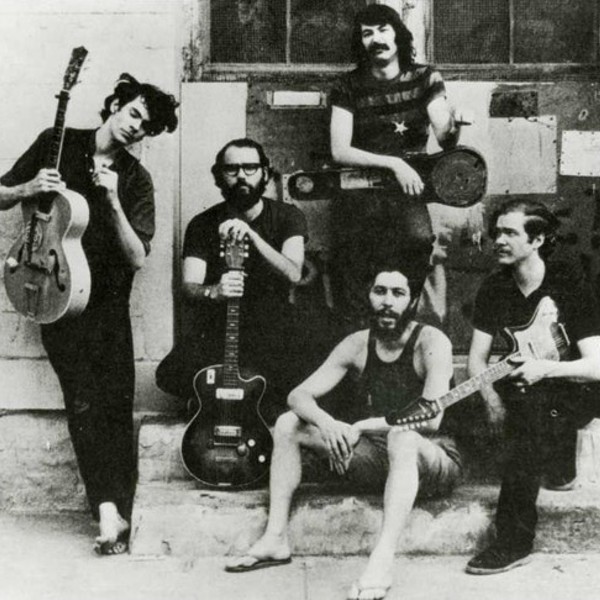It’s 1:10pm and your typically overbooked music editor is stressing while doing his best to maintain the speed limit en route to a scheduled 1pm sit-down with Daniel Littleton and Elizabeth Mitchell, the core members of lineup-shifting indie outfit Ida at Woodstock’s famously busy eatery Oriole 9. Having conducted interviews in crowded restaurants before, this scribe is nervously dreading the prospect of once again struggling to maintain the conversation’s focus while tuning out the extraneous clatter of a bustling bistro.
He needn’t have worried. After a quick move to a center table, away from the one directly beneath the stereo speaker, the tension dissipates and the surrounding world melts away, barely registering as Littleton and Mitchell, both 39, discuss their past, their family, and their excellent band’s beautiful seventh album, Lovers Prayers (2008, Polyvinyl Record Co.). Ida, it seems, can find the quiet in any situation. A crucial quality for a group that came of age in the world capital of noise, New York City, to make some of the most brazenly soft and intensely moving sounds in indie rock.
“It’s true, we were pretty incongruous with most of the rock scene in New York. But we kind of liked it that way, being different,” muses guitarist and singer Littleton. “Our music is, I guess you’d say, a lot more pastoral. Liz and I are definitely attracted to more stripped-down stuff. We love to hear the space between the sounds, and I think our own music has actually gotten even more spare these last few years.”
Critics commonly chuck Ida in a ghetto they call sadcore, a subset also reserved for such non-Gotham acts as American Music Club, Red House Painters, Low, and the late Elliot Smith, varied artists who all happen to play poignant music at glacial tempos. Yet despite the often heartrending moods that Ida’s songs share with those of the above, Littleton and Mitchell’s music is out of place in this grouping, too, thanks in part to their referencing of traditional folk styles; over the years, the acoustic-based band has covered Bill Monroe, Leadbelly, the Carter Family, and other such immortals, a method mostly at odds with its supposed genre mates, who tend to be darker and less roots-conscious.
Which leads to another paradoxical aspect of Ida’s oeuvre: children’s music. The group has released one album of kid-oriented folk songs (covers of Woody Guthrie, Elizabeth Cotton, et al.) under its own banner, You Are My Little Flower (1999, Last Affair), while Mitchell has released two, You Are My Sunshine (2002, Last Affair) and You Are My Little Bird (2006, Smithsonian Folkways), efforts she describes as “solo records in name only; they’re really Ida records since they have all the same people playing on them.” (Mitchell and other children’s musicians were profiled in the January 2007 issue of Chronogram; the singer, guitarist, and harmonium player is currently at work on a new children’s album.)
And here’s one more curveball for those who think they have this gentle, melancholy combo all figured out: Littleton’s own roots are in hardcore punk. As an active participant in his native Washington, DC, area’s underground scene, he performed with proto-emo quartet the Hated and cites the city’s legendary Bad Brains as a lifelong influence for their genre-spanning punk/reggae approach. (Bad Brains, now based in Woodstock, were profiled in the November 2007 issue of Chronogram.) “Part of the DC hardcore doctrinaire is to be open to many types of music,” Littleton explains. “So when I eventually connected with artists like Joni Mitchell, Nick Drake, and Sweet Honey in the Rock, what I got from them was just as ‘hardcore’ as what was behind [infamous punk outfit] MDC’s music.”
After the Hated broke up, Littleton played in several other bands before eventually moving to Boston. There, through a mutual friend in 1990 he met Mitchell, who was then a student at Brown University in Providence, Rhode Island, and a habitué of the local coffeehouse folk circuit. The pair stayed in touch and began dating the following year, and after Mitchell started teaching nursery school in Brooklyn, Littleton moved there to join her. With no grand plans, the couple began capturing their musical collaborations on “super lo-fi” tapes intended only for friends.
One of these friends, however, was indie icon Jenny Toomey of the influential quartet Tsunami and the co-founder of seminal label Simple Machines. Spotting something magical through the hiss of Mitchell and Littleton’s cassettes, Toomey was keen to see the couple get their project out of the apartment and into the clubs and the studio. “Dan and Elizabeth are such spectacular songwriters and singers,” says Toomey, who went on from performing to become executive director of musicians advocacy group the Future of Music Coalition and is now a program officer at the Ford Foundation. “A lot of music from [the early ’90s] doesn’t hold up now, but the early Ida stuff still sounds great. It’s definitely lasting music.”
After testing the waters in 1993 with some local shows, Ida added Littleton’s brother, drummer Michael Littleton, for its first gig outside New York, a benefit concert in Washington, DC. “I looked out from the stage and there was [Minor Threat and Fugazi front man] Ian MacKaye and [Unrest singer] Mark Robinson,” Mitchell recalls. “I was so nervous! But it ended up being a really good show.” Soon after, the twosome backed up Mitchell’s old Brown roommate Lisa Loeb on her 1994 chart-topper “Stay” and began work on Ida’s debut, 1995’s Tales of Brave Ida (Simple Machines). Its dreamy, tender folk-pop, as heard on the reflective “Slow Dance” and “Tempting,” won the group enthusiastic comparisons to pivotal ’80s trio Galaxie 500.
Following 1996’s I Know About You, Ida became a quartet by adding bassist and Woodstock native Karla Schickele (the daughter of composer Peter Schickele) for 1997’s bewitchingly intimate Ten Small Paces (both discs were released on Simple Machines). During an early visit to the area that netted “Ashokan Reservoir,” a live recording for the latter album, Mitchell and Littleton encountered the natural—and supernatural—qualities of the Catskills. “We recorded that song at night in the woods,” Littleton says. “Which was definitely a quasi-mystical experience.” It’s not hard to believe him: The chittering crickets that swath the tune’s softly strummed acoustic instruments make the mere act of listening to it a spiritual episode in itself.
Mitchell and Littleton were wed in 1999, and the group continued to record, tour, and build a following. But after her band pulled out of an ill-fated deal with Capitol and released the sublime Will You Find Me (2000, Tiger Style), Mitchell found herself at a career crossroads, having to take more and more time off from teaching to go on the road. And while 2001 next saw the band expand to include upright bassist Zach Mitchell and violinist Ida Pearle for another acclaimed album, The Braille Night (Tiger Style), the arrival of the couple’s daughter, Storey, that same year necessitated a slowdown. So while marking time with a remix album, 2002’s appropriately titled Shhh… (Time Stereo/Carrot), Ida took a break as the new family looked for a roomier and more suitable home, relocating first to Providence and eventually to Woodstock in late 2004. The next year brought the brilliant Heart Like a River (Polyvinyl), a set recorded in piecemeal fashion over the preceding two years; amid touring and other projects, Mitchell and Littleton settled into the community, getting to know and work with a host of top local players.
Of course, if you’re talking tops, Levon Helm is one of the first, if not the first, upstate musician that comes to mind. So the couple were understandably besides themselves when Ida first performed with venerated outsider folk artist Michael Hurley at one of Helm’s Midnight Ramble sessions in 2006, and then ensconced itself in the ex-Band man’s studio for the making of Lovers Prayers—an occasion made even more special by the appearance of Hurley and Helm on the album, which Mitchell gushes as being simply “mind-blowing.” “It really was,” concurs Littleton, who names Hurley’s 1971 LP Armchairboogie as a crucial work. “Playing with Michael was a huge thrill. And Levon just knows how to make anything sound better—he makes everybody in the room feel really good.”
Among those in the room was session cellist Jane Scarpantoni, who has worked with Bruce Springsteen, Lou Reed, REM, Rufus Wainwright, the Beastie Boys, Patti Smith, and others. “Playing with Ida was just a total joy,” says Scarpantoni. “Their music is really low-key, but it has a real openness to it. It’s very uplifting, very spiritual.”
Produced and engineered by the band’s longtime collaborator and “secret weapon,” His Name is Alive’s Warn Defevr, Lovers Prayers is definitely Ida’s most “live”-sounding disc to date. Marked by a looser, more organic vibe than on earlier recordings and rich with new hushed, sparse treasures like the loping “See the Stars” and the gorgeously muted “The Love Below,” the album has led many to posit that when Ida moved from the city to woods, the woods moved into Ida’s music.
“We do agree with that,” says Littleton, adding that Ida will tour Japan in the fall and has an EP, My Fair, My Dark (again featuring Helm and Hurley), due out on Polyvinyl in August. “It definitely feels like since we’ve been here the band has entered a new chapter.”
A chapter many of us will want to read again and again. But not too loudly, of course.


















